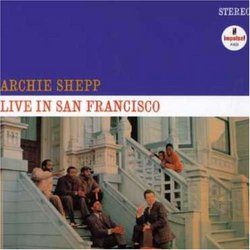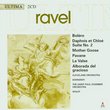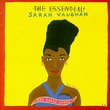| All Artists: Archie Shepp Title: Live in San Francisco (24bt) (Mlps) Members Wishing: 1 Total Copies: 0 Label: Universal Import Original Release Date: 1/1/2007 Re-Release Date: 7/23/2007 Album Type: Import, Limited Edition, Original recording remastered Genres: Jazz, Pop Style: Avant Garde & Free Jazz Number of Discs: 1 SwapaCD Credits: 1 UPCs: 4988005285478, 4988067003515, 667341978926 |
Search - Archie Shepp :: Live in San Francisco (24bt) (Mlps)
 | Archie Shepp Live in San Francisco (24bt) (Mlps) Genres: Jazz, Pop
Japanese 24 Bit/96KHz remastered reissue of 1966 album originally issued on Impulse!, packaged in a limited edition miniature gatefold LP sleeve. 2001. |
Larger Image |
CD DetailsSynopsis
Album Description Japanese 24 Bit/96KHz remastered reissue of 1966 album originally issued on Impulse!, packaged in a limited edition miniature gatefold LP sleeve. 2001. Similar CDs
|
CD ReviewsChallenging,passionate music of the sixties Ian Muldoon | Coffs Harbour, NSW Australia | 01/14/1999 (4 out of 5 stars) "Archie Shepp has always been a musical hero of mine. His tenor can sound as beautiful as any tenor sound in jazz as it does on TROUBLE IN MIND and GOIN' HOME (1979). But it can also be raw and passionate as it is on LIVE IN SAN FRANCISCO. This music is of its time but still worth listening to fuelled as it is by anguish, anger and a profound sense of injustice at being black in America. Charlie Parker said " if you don't live it it won't come out of your horn" and Archie Shepp was one of the great exemplars of that saying - he spoke to and of the sixties through his music as much as Martin Luther King did in his way. This is challenging music -it's not sweet music. It's passionate, proud and intelligent music. It is music which says ATTENTION MUST BE PAID. There are two full LPs on this 20 bit remastered and bautifully packaged CD. Both were recorded at BOTH/AND CLUB in SAN FRAN on Feb 19, 1966. The second LP was originally issued as a continuous 33 minute work which divided into two parts, formed side one and two of the LP and is now presented as it should be in one piece. With Shepp are some of the most renowned musicians of the "new" music as it was called in the sixties including Roswell Rudd on trombone and Beaver Harris on drums. Donald Garrett and Lewis Worrell are the bassists. These are master musicians who have chosen to play this music. One track is recitation by Shepp called THE WEDDING backed only by the arco bass of Worrell. The listener may be surprised by the consummate articulation and rich voice of Shepp the actor. I was. This music is also of rich historical interest and anyone even vaguely interested in the evolution of American society into a more just and civilized one, will find this music enriching with being ponderous. It is not just entertaining music. I'm glad I purchased this album." Free jazz and tradition JEAN-MARIE JUIF | BESANCON France | 09/16/2001 (5 out of 5 stars) "Three of these eight tunes are standards; it may seem curious for a free jazz recording of the late sixties,no ? It was recorded February 19,1966, and I was three days old.Archie Shepp's music of that time isn't easy to listen to;more difficult than Coltrane's music.But there is always links to the tradition,and to the great ancesters.In this record,there are outstanding musicians: Beaver Harris on drums,rather a colorist than a drummer,just like Sam Woodyard in Duke Ellington's band;Don Garrett on bass,who played with Roland Kirk and Coltrane,and who does fine job,even if he doesn't reach the level of Cameron Brown in his 70's efforts with Shepp;and Roswell Rudd on trombone,an heir of Tricky Sam Nanton and Dickie Wells.In this record, Shepp pays tributes to two great composers,Duke Ellington ("in a sentimental mood" and "things ain't what they used to be",althouth this one was written by Duke's son,Mercer),and Herbie Nichols ("lady sings the blues",a tune Nichols wrote for Billie Holiday).Shepp also plays a great ballad on piano,"Sylvia".There are shadows of Teddy Wilson and Duke in his piano playing.Shepp's version of "in a sentimental mood",a haunting tune written by Duke (Duke recorded it with Coltrane a few years before),is outstanding.Listening to him,we can hear Hawkins,Ben Webster, and all the history of tenor sax.You can call it "free jazz",if you wish;to me it's only a great hour in the jazz history,recorded at a time when things were not easy for black people in America (are they now???).This is strong,brutal,offensive music,but most of all, living music,with urgence and violence, a beautiful human cry that,35 years later, is always as vital as it was,February 19,1966."
|

 Track Listings (6) - Disc #1
Track Listings (6) - Disc #1

